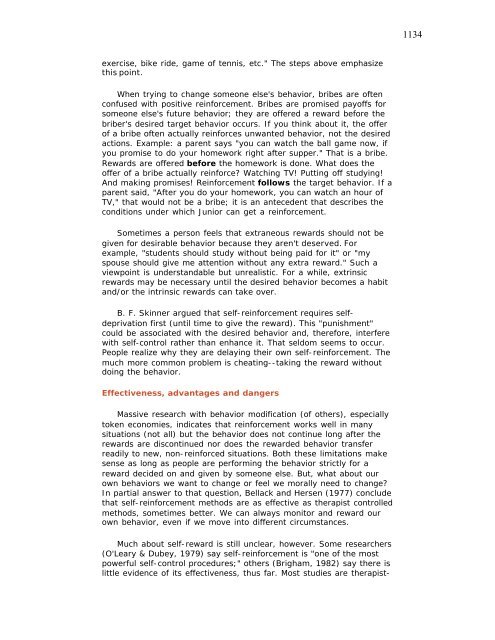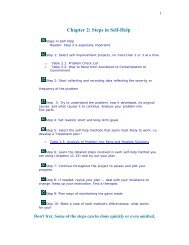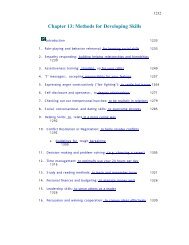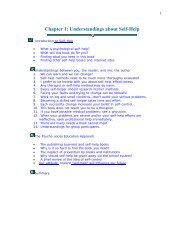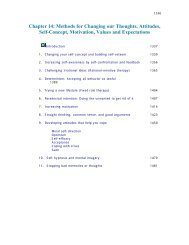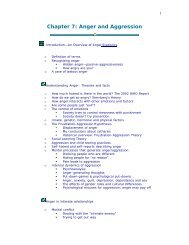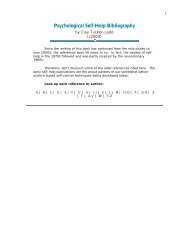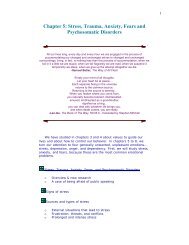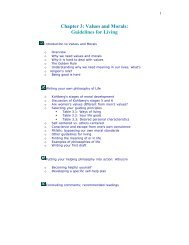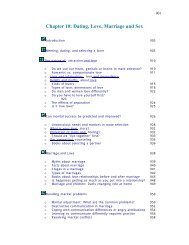Methods for Changing Behaviors - Psychological Self-Help
Methods for Changing Behaviors - Psychological Self-Help
Methods for Changing Behaviors - Psychological Self-Help
Create successful ePaper yourself
Turn your PDF publications into a flip-book with our unique Google optimized e-Paper software.
exercise, bike ride, game of tennis, etc." The steps above emphasize<br />
this point.<br />
When trying to change someone else's behavior, bribes are often<br />
confused with positive rein<strong>for</strong>cement. Bribes are promised payoffs <strong>for</strong><br />
someone else's future behavior; they are offered a reward be<strong>for</strong>e the<br />
briber's desired target behavior occurs. If you think about it, the offer<br />
of a bribe often actually rein<strong>for</strong>ces unwanted behavior, not the desired<br />
actions. Example: a parent says "you can watch the ball game now, if<br />
you promise to do your homework right after supper." That is a bribe.<br />
Rewards are offered be<strong>for</strong>e the homework is done. What does the<br />
offer of a bribe actually rein<strong>for</strong>ce? Watching TV! Putting off studying!<br />
And making promises! Rein<strong>for</strong>cement follows the target behavior. If a<br />
parent said, "After you do your homework, you can watch an hour of<br />
TV," that would not be a bribe; it is an antecedent that describes the<br />
conditions under which Junior can get a rein<strong>for</strong>cement.<br />
Sometimes a person feels that extraneous rewards should not be<br />
given <strong>for</strong> desirable behavior because they aren't deserved. For<br />
example, "students should study without being paid <strong>for</strong> it" or "my<br />
spouse should give me attention without any extra reward." Such a<br />
viewpoint is understandable but unrealistic. For a while, extrinsic<br />
rewards may be necessary until the desired behavior becomes a habit<br />
and/or the intrinsic rewards can take over.<br />
B. F. Skinner argued that self-rein<strong>for</strong>cement requires selfdeprivation<br />
first (until time to give the reward). This "punishment"<br />
could be associated with the desired behavior and, there<strong>for</strong>e, interfere<br />
with self-control rather than enhance it. That seldom seems to occur.<br />
People realize why they are delaying their own self-rein<strong>for</strong>cement. The<br />
much more common problem is cheating--taking the reward without<br />
doing the behavior.<br />
Effectiveness, advantages and dangers<br />
Massive research with behavior modification (of others), especially<br />
token economies, indicates that rein<strong>for</strong>cement works well in many<br />
situations (not all) but the behavior does not continue long after the<br />
rewards are discontinued nor does the rewarded behavior transfer<br />
readily to new, non-rein<strong>for</strong>ced situations. Both these limitations make<br />
sense as long as people are per<strong>for</strong>ming the behavior strictly <strong>for</strong> a<br />
reward decided on and given by someone else. But, what about our<br />
own behaviors we want to change or feel we morally need to change?<br />
In partial answer to that question, Bellack and Hersen (1977) conclude<br />
that self-rein<strong>for</strong>cement methods are as effective as therapist controlled<br />
methods, sometimes better. We can always monitor and reward our<br />
own behavior, even if we move into different circumstances.<br />
Much about self-reward is still unclear, however. Some researchers<br />
(O'Leary & Dubey, 1979) say self-rein<strong>for</strong>cement is "one of the most<br />
powerful self-control procedures;" others (Brigham, 1982) say there is<br />
little evidence of its effectiveness, thus far. Most studies are therapist-<br />
1134


